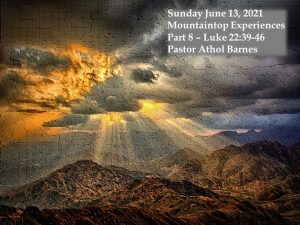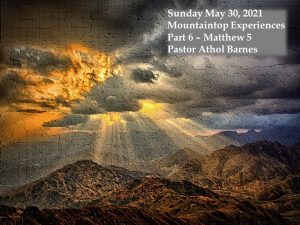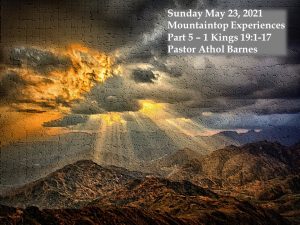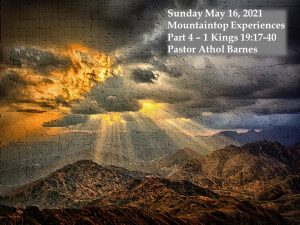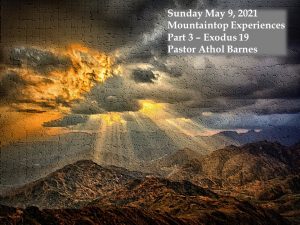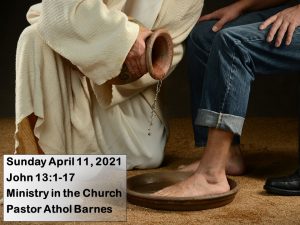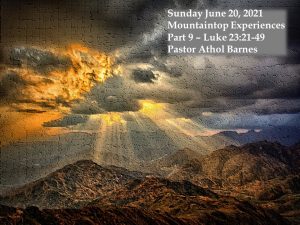
Mountain top experiences part 9
Luke 23:21-49
Calvary is the mountain top encounter that all the others point to. This little hill just outside Jerusalem, is the peak on which all of human history pivots. During the Roman empire, this was the place where criminals were executed by the most inhumane method of crucifixion.
As we look at the various people who witnessed the death of Jesus, I want to challenge you by saying that on that day, Jesus had only one follower. There were many observers but only one follower. Looking at your life today, are you a follower or are you an observer?
As we read the account of the crucifixion, we subconsciously categorize people as guilty or innocent. The women were innocent, the soldiers were guilty, Pilate was confused and guilty, Simon of Cyrene was innocent, and the two criminals were both guilty, but one was saved.
But the reality is that there was only one person innocent in the entire world, and that was Jesus. Luke does well to point this out in Luke 23 verses 22, 41 and 47.
Jesus was the only one who was sinless, and he died for all sinners (see Romans 3:22-23).
Everyone was impacted that day by the decisions they made and what they saw.
Pilate saw that Jesus was innocent and he tried to recuse himself (see Matthew 27:24).
He was a politician and a people pleaser. He did not have the character to stand by his convictions. But I wonder if I would have the courage to stand against the angry crowd on that day. He gave in to the pressure of the fear of man, and as a result he was guilty.
Simon of Cyrene was not involved in the crucifixion but was drawn in (Luke 23:26).He was a religious man from Libya who had travelled eight hundred miles to celebrate the Passover. Jesus was understandably exhausted and weakened by the beatings and interrogations, and could not carry the cross, so the crowd had this foreigner carry the cross.
There is a significant picture here, to carry your cross was a sign of guilt, it was perfectly ordained by God the Father that Jesus was not to carry his cross to the hill.I want to come back to Simon later in this article.
The rulers, soldiers and one of the criminals mocked Jesus. These religious leaders were the men who had studied the law and the prophets, the Old Testament, but they were blind to what they were doing. In verse 36, we read that the soldiers mocked him, getting drawn along by the crowd, they seemed to be enjoying the moment and teased Jesus. Even the dying criminal next to Jesus had energy left to mock and jeer at Jesus.
But then we come to the repentant criminal. His dialogue with Jesus is often used to explain the fact that we are saved by grace and not by works. There is nothing this criminal could do to earn his salvation, he simply asked Jesus to save him. But we can easily miss the tremendous faith that it took for him to ask Jesus to save him. He possibly had never seen Jesus before, we don’t know. But here in front of all the people, as he was dying, he declared that Jesus was the King of Kings. If you were drowning, would you ask a drowning man for help?
Here was a dying man, asking a dying man for help. A crazy idea, unless he really believed that Jesus was the son of God.
As Jesus died, we have a snapshot of a centurion. He was a hardened Roman soldier who had probably witnessed hundreds of crucifixions, but he had never seen anyone die like Jesus did. He knew that Jesus was innocent, and he gave glory to God. He knew that he had just witnessed God in the flesh, and he was forever changed.
The people who were cheering the crucifixion were changed (Luke 23:48). They came to see a spectacle and to mock but left in fear and remorse. As they witnessed the spotless son of God dying, they became aware of their own sins and began grieving. How terrible and hopeless that must have felt for them.
Coming back to Simon, the man recruited to carry the cross. It is likely that what he saw that day, led him to be a Christian. In Mark 15:21 and Romans 16:13 we see that his sons were a part of the early church.
Carrying the cross changed Simon and, on that day, he was the only true follower of Jesus. He was walking out a prophetic picture of what it means to be a Christian. Jesus said in Matthew 16:24, Then Jesus told his disciples, “If anyone would come after me, let him deny himself and take up his cross and follow me.”
Before Simon met Jesus, he was a religious Jew, going about his devotion. But to come to know Jesus, he had to leave behind his plans and his religion. He had to die to his plans and his ideas of what he wanted to do, and then he had to take up the cross of Jesus. Do you see the picture?
Matthew 16:24 is often misinterpreted. People often talk about a “cross” as a burden to carry, something like a chronic sickness or a thankless job, and we say, “it is my cross to bear”
But this is not what Jesus meant. In the 1st century, to carry your cross, was to walk to your death. It was a cruel and humiliating form of capital punishment. It wasn’t a temporary inconvenience.
Today we celebrate the cross as a symbol of our salvation and the love of God, but when Jesus said these words, it would have sounded a whole lot different.
To take up your cross is to completely abandon our plans and goals and submitting to the perfect will of God. This is the first step in being a follower of Jesus (see Luke 14:27).
Are you a follower of Jesus? Have you seen that radical change in your life? Or are you still the master of your own plan.
I can assure you that the only way to live in peace and have eternal salvation, is to be a follower of Jesus and not an observer.


